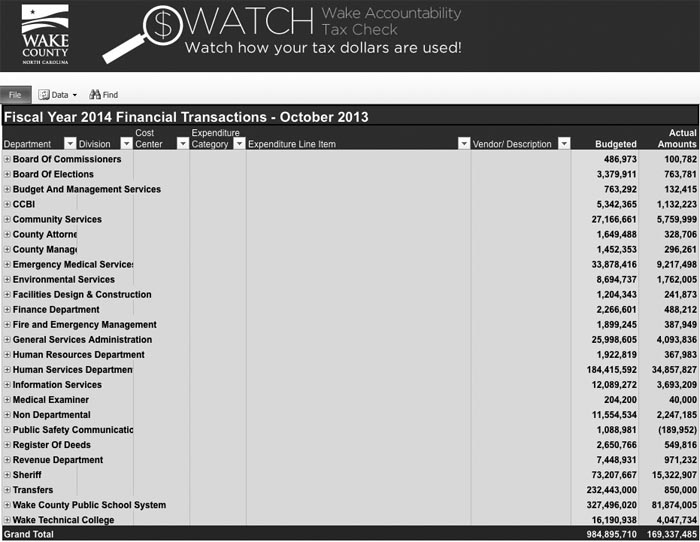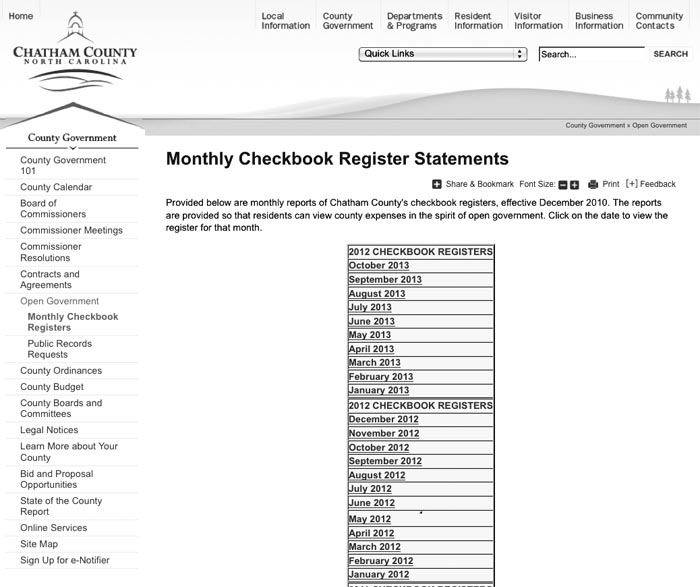Competitive Sourcing
Recommendations
Put contracts and detailed spending information online. NCOpenBook.gov and Wake County's WATCH website offer good examples of accessible, transaction-level detail updated daily.
Use XML and structured formats for data transparency. Data is only useful if it can be analyzed. Open data standards make this easier.
Develop meaningful outcome measures, and hold government agencies accountable for results.
|
Background
Local governments should build accountability and transparency into their budgeting and management processes, as they have with meeting agendas, videos, and social media. Many of the tools to achieve that goal also help government employees succeed in their jobs.
Many local governments are posting agendas, audio, and video from commission meetings. They are adding crime maps, documents related to zoning, and building permit requests. More governments and individual elected officials are on Facebook and Twitter. These are all positive steps toward greater involvement of citizens.
Citizens need solid information about how government works and what they get for their tax dollars if they are to be truly engaged. Local governments should help citizens to understand how they pay for services. They also need to measure and report results, then make decisions that hold managers and programs accountable.
As budgets have become increasingly complex, citizens are less able to monitor how their taxes are spent. Government managers also need better information in order to use tax money in the most effective ways.
Much of what is available online now is of limited value. Documents are buried deep within websites and are difficult to find. If they are found, data may need to be reentered to make the information useful. PDF is not a data format. With Google docs and other online tools, governments face fewer roadblocks to making more information readily available to citizens and employees.
To understand local government spending, an elected official or citizen must consult a number of documents, go through hundreds of virtual or real pages, add numbers together, and sometimes extrapolate from the past. Even when local governments are given a standard format for data entry, such as for the State Treasurer's Annual Financial Information Reports, the data that go into the report differ from locality to locality and even within the same county or town over time.
Many counties report spending in budget ordinances. To receive an entire line-item budget may require a formal request to the county manager. Even then, the line items are often confusing, leaving individuals unclear about exactly how governments are spending their money.
Newspapers in some of the larger metropolitan areas (Raleigh-Durham, Charlotte, Wilmington) have begun creating their own searchable databases of government employees' salaries and pension benefits. These are helpful for citizens, but not as timely as would be possible if governments managed their own databases.
Analysis
Governments at all levels have taken steps to make more information available online, assisted by the press, the John Locke Foundation, and other groups. They have also made operations and processes more transparent with online calendars and agendas.
North Carolina has an online directory of contracts, stimulus projects, and grants. Wake County makes information available in its online database, WATCH.
Newspapers across the state post salaries of state and local employees in easy-to-use databases. NCTransparency.com acts as a portal to transparency resources.
Open data standards allow better analysis of data and make it possible to combine with other online sources.
Wake County's open-government website (http://wakegov.com/budget/watch)

Chatham County's open-government website (http://chathamnc.org/index.aspx?page=1503)

Analyst: Julie Gilstrap
Research Publications Coordinator
919-828-3876 • jgilstrap@johnlocke.org
The entire 2014 City & County Issue Guide, is available for download as a 3.6MB Adobe Acrobat file.
The free Adobe Acrobat Reader is required to view or print this document.
| 


